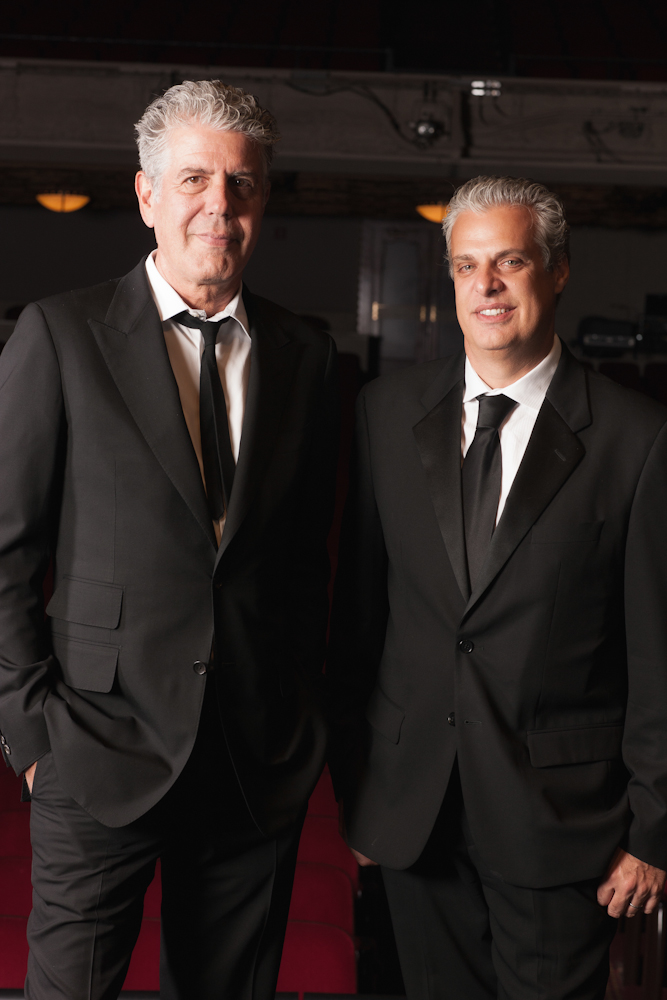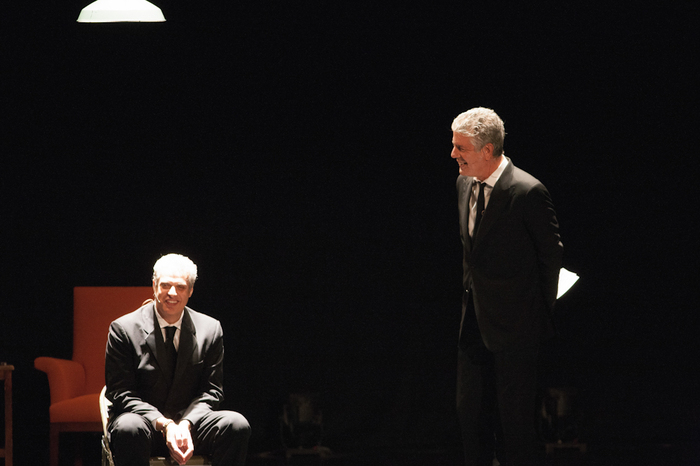
Photos and interview by Jamie Soja
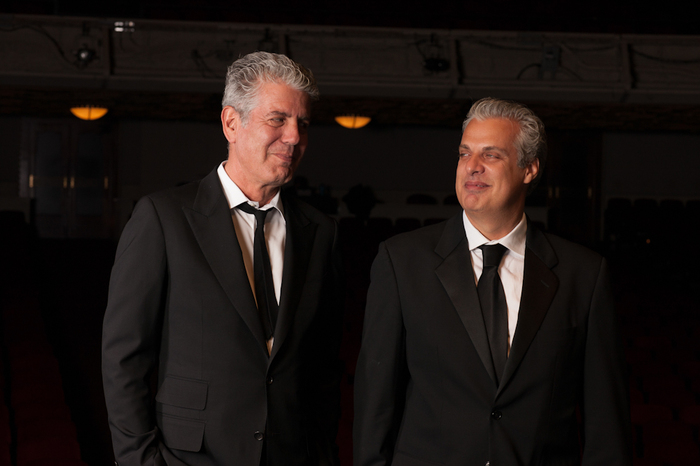
Before their recent show at the historic Orpheum Theater in San Francisco, I had the opportunity to interview Anthony Bourdain and Eric Ripert about their upcoming work and new adventures, their perspectives on the food scene in San Francisco, and their perspectives on the movement toward locally grown foods.
ANTHONY BOURDAIN
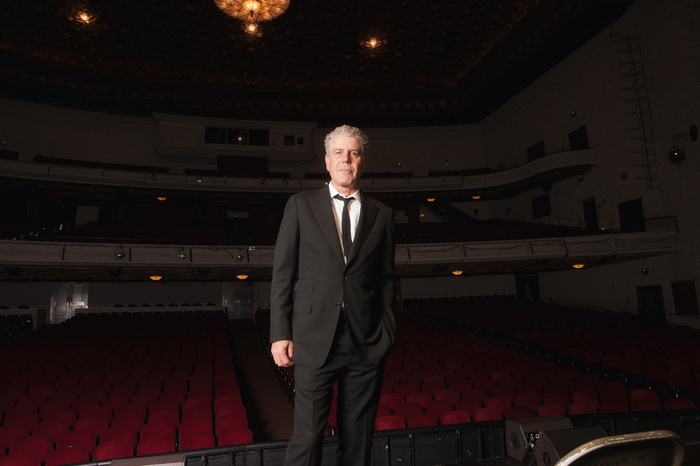
You have a new show titled Parts Unknown. What are the perks of working with CNN in terms of access? Where are you looking forward to traveling to that you couldn't film before? Do you have any worries about traveling places that were previously off limits?
AB: Well, already I have sort of fulfilled the dream of shooting in Congo, which is a place I have wanted to shoot for five, six years and just haven't been able to do. No other company was even remotely willing or able to send a crew there and CNN didn't blink. They have contacts, they have experience, they understood the situation on the ground. They've shot all these places, they shoot all these places, and they are prepared to shoot at all these places at a moment's notice. So it's a huge advantage. Places like Libya, Congo, Myanmar, not just having the infrastructure, the assets, and the contacts, but the willingness have been very, very open from the get-go to making it possible for me and my creative team to go anywhere we want, anywhere, whether it's Detroit or the Congo.
In a lot of ways your shows have pushed the boundaries of travel shows into hard news and moving into doing more risky things.
AB: Well, I'm not searching for hard news, I'm not a journalist but I'm interested in pushing to boundaries of where we can do the kind of stories that we want to do. I mean, it's a big world and CNN has made it a lot bigger and they haven't flinched. It's been a learning curve for us. I mean, In Libya, we had to really learn an entirely new shooting style for security reasons. We just got a tiny little taste of what foreign correspondents do all the time and have done for years. It's exciting. The Congo was the most difficult shoot of my life but was also maybe the greatest adventure of my life. Go up the Congo River in Africa, Stanley and Livingston, Bogey and Hepburn, and Conrad. Who gets to do that?
When does that episode air?
AB: Soon, in the first block of show, so a few weeks away.
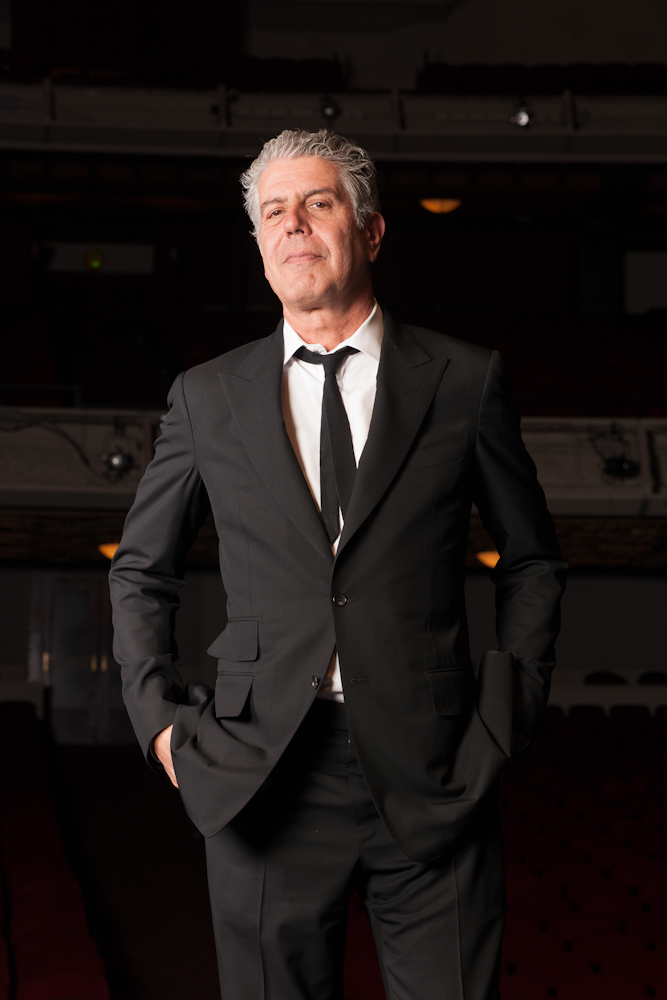
How has your approach to filming, planning of the episodes, and your on-screen persona changed since your TV series A Cook's Tour?
AB: Well, my persona hasn't changed at all. I am the same person I was. Look, I never had to behave for the camera. I've been really fortunate in that I guess I was hired to do A Cook's Tour, I was already a known quantity, meaning I had written a really obnoxious book and nobody expected me to be anyone that I wasn't already. I didn't know how to make television, I didn't understand the process at all when I went out on A Cook's Tour but I learned along with the camera people on that show. The camera people on that show are now my partners at 0.0. So we grew up together. I don't know that I know how to make normal television, but I know how to work with the people I have been working with, whatever it is that we have been doing I think that we get better at it every year.
ERIC RIPERT AND ANTHONY BOURDAIN:
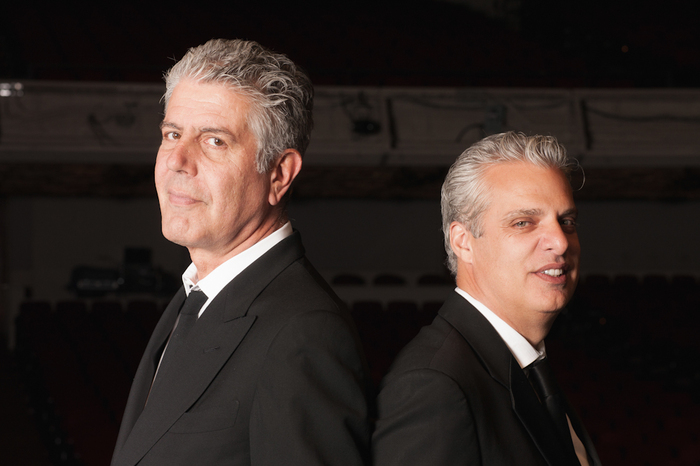
What are big things happening in the California culinary scene? What about in the San Francisco Bay Area?
AB - Eric, over to you. What's happening, what's new?
ER - Well, It's a lot of new things happening in the scene of San Francisco. A lot of chefs that travel around and were from San Francisco and the region are back and opening their restaurants and it is very exciting to see the cooking they are doing. And last night I was in a place called Locanda and I was very surprised to see the chef and sous chef cooking great food and then I realized they worked with me 10 years ago for three years. (Laughing) I thought it was a great compliment. Obviously California is fantastic in terms of produce, vegetables. You know you find great ingredients here and that new generation is evolving exactly like that previous generation was ahead of the curve in many ways.
AB: For me the biggest thing that is happening in San Francisco the last years is Danny Bowien at Mission Chinese. Mission Chinese started in San Francisco. It's really, maybe, one of the most influential restaurants in America right now. Started in San Francisco, It spread to New York. It's kicking ass in New York, it's moving to Paris.
ER - Is it?
AB - Oh yeah, Mission Chinese is opening in Paris.
ER - That's a big deal, gutsy move.
AB - Trying to think of any example previously of a restaurant, or a style, or a genre that originated in San Francisco and spread not just to New York but to Paris and has really taken over, has grabbed the zeitgeist as ferociously, no, and I think the imitators..., it's a big open door. That level of flavor, heat, reckless disregard for convention, a Gonzo, do it yourself style, and let's just say heat again. It is a, I hate to use the word trend-setting, I mean it really changed the playing field in New York a lot. You'll be seeing a lot of people trying to be like Danny. So for me that's still the big news out of San Francisco.
Have you heard of many other chefs doing much out of the Mission or is this kind of the first?
AB - I can't think of anybody that who had a successful restaurant in San Francisco, who opened another one in New York that was welcomed as avidly as Mission Chinese and then is opening an outpost. Already that's remarkable. Restaurant power rankings in New York, the restaurant everyone wants to get into, it's still way up there. I think the French are going to love it, I think they're going to go bat-shit and I think it's going to be a very influential restaurant in Paris. And bring the pain man, because that is levels of heat unseen by mortals in quite some time out of China. (Both laughing)
Sichuan?
ER - Yes
AB - It's Gonzo Sichuan, it's not authentic, it's just delicious.
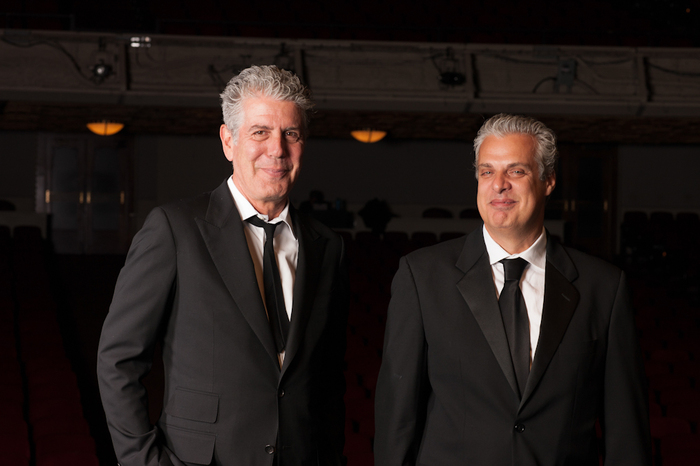
How did you both first meet? Why title this show, Good vs. Evil?
ER - That's a good question. It's his fault, as usual. (Laughing)
AB - Eric called me up after reading Kitchen Confidential. Yeah I think it's an open question, who's good and who's evil. I would have said I was the evil one but now I am beginning to wonder. (Laughing) After your crude remarks on CNN the other day.
ER - (laughing) He's the king of manipulating. You know what it's like. He's very good at that. He's trying.
AB- I'm all about watching cartoons with my daughter.
ER - Yeah, totally.
AB - I'm like Ward Cleaver.
ER - (smiling) We all believe that, Tony. We have no doubt about it.
AB - It's sort of a boxing motif. Someone's got to be good, like in a wrestling match there has always got to be a heavy. I thought it was me but... (Smiling and looking at Eric)
And how did you meet?
ER - When he wrote Kitchen Confidential I read the book. First of all I loved the book, also he was saying nice things about Le Bernardin. I was very happy, actually, because he wasn't saying nice things about everybody and I called him and invited him for lunch and we had lunch, we had a good time, and that was the beginning of the friendship.
AB - That's the cover story. Actually, I used to buy Crystal Meth from him back in the '90s (Both laughing) and.. no...
Anthony, you recently said "There is nothing more political than food, what people are eating and what they are not eating." The politics of commercially grown food for cheap versus locally and sustainably grown food is a hot topic in California and has been for a long time in the Bay Area. What do you think of this and its relationship to the history of food and food now?
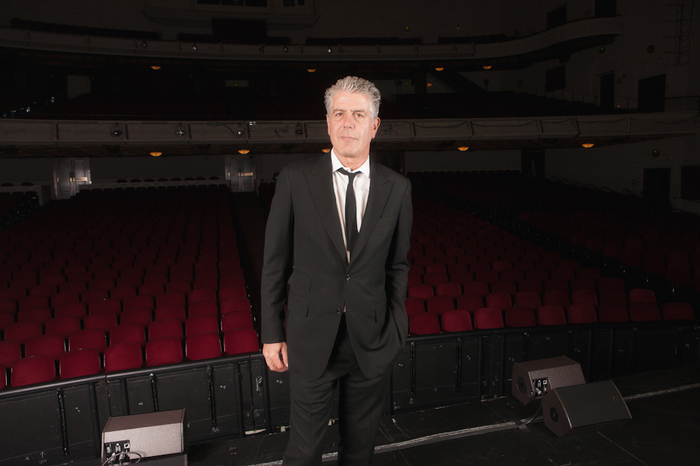
AB - I, personally, think there is a really danger of taking food too seriously. Food should be part of the bigger picture. I think the Italian's have the right balance. Here, what you're eating is so... what you're eating identifies your political affiliation, how you feel about a whole lot of other issues. There is a certain amount of, by saying you eat this, you are at the same time making other people feel bad about their choices. I think in fits and starts we're, America as a whole, sort of grappling with this leap forward. We didn't care where our food came from at all, or who made it, 30 years ago. Now, maybe, we're a little over enthusiastic or taking it too seriously. We take pictures of it, I take pictures of it obviously. I think it can get a little distorted at times. But I think it is all for the good. Its better that we care too much about food and where it comes from, and who makes it, and how it's made than care too little.
ER - I think it is a very exciting time because in America 20 years ago, you couldn't find fresh basil in the supermarket or anywhere else. There was none and from 20 years ago to five years ago, this kind of food revolution and excitement about food and it's true that some people are getting obsessed, going overboard, and so on, however I think it's a good thing that people care about good food, where the food is coming from, creating sustainability, that keep people taking care of the land, taking care of fishing and so on. I'm very excited about that. It's a good thing.
AB - It's something I like to torment Eric with, you know. I like to take an adversarial position though I suspect, in fact, I think we agree about the importance of, or at least we encourage local, sustainable. Who doesn't want to support farmers? Who doesn't want better product? Who doesn't want product that's less destructive to the environment? I'm for all of those things. But I think it's useful to raise the question constantly is it really important where my fucking tomato comes from? Is our responsibility just to serve the best tasting tomato? Do we have to be your ethicist too? What business are chefs really in? Do I have to have a social conscience?
ER - Yes
AB - Is that important?
ER - Yes
AB - Really?
ER - Yes
(Both laughing)
AB - See. I mean, I agree. I think as citizens of the world we should consider these things but I think some balance is needed. There's a lot of hypocrisy in the world. I can't resist poking my thumb in the eye, now and then.
ER: It was my eye.
(Both laughing)
AB - I just don't like to get lectured on sustainable and local from somebody that's ordering half their shit from Chino Farms in San Diego.
ER - I agree with that, however I think it is important also to pay the right price for the food. Because by doing that you are supporting people who are the source and you are supporting an entire economy. By trying to get the cheapest product and by not paying the price, taking shortcuts, and so on, you encourage, first of all, some bad practices and also it's not sustainable for the people who are farmers or taking care of the land.
AB - And we never ask who farms. Who picks our vegetables? In this agrarian wonderland, some would have us envision, who will be working on these farms. It sure as shit won't be us. Is anyone suggesting we should return to the soil? That's certainly not the movement of history, if you go, I've spent a lot of my life over the last ten years in farming regions, in agricultural economies where that's what they do. Rice country in Southeast Asia, India, Africa. I've spent a lot of time with actual farmers. It's an incredibly hard business and most of them are killing themselves so their kids can become doctors or engineers. The last thing they want for their kids is to be farmers. So to have rich people from the comfort of their Mansions talking about how people should return to the farm or stay on the farm, I think we've got to be careful about this. A flat screen TV for a guy growing Yucca in the Amazon is the realization of a dream. Why shouldn't they have the dream that we take for granted. That's not a fully fleshed out argument but it's a useful balance, I think, to this overzealous embrace of the soil as some romantic creamy ideal. (turns to Eric) Hit me (both laughing).
ER - I come from a family of farmers on both sides of my family.
AB - Yeah, my people were oyster farmers.
ER - Yeah, sure. I'm still in the kitchen working most of my time. Except when he takes me out. So, I like the idea of people living from the farm, cultivating the land. Yet, it's a hard life in many ways but it brings a lot of reward. Money is not necessarily, although it helps a lot for happiness, it's not necessarily the best way to be happy, to be rich, you know. My grandparents were humble people and they were very happy, and they grew up in the farms, and they had their children there and so on.
AB - In the field they would just be picking drop the kid up, sling it over the shoulder. (Smiling)
ER - No, listen, I come from France, I don't come from Vietnam. You know, technology has evolved a lot too Tony.
AB - I know, because I remember my Uncle Gustauv, going out on the boat with him, the oysters, back then they didn't even have the bags.
ER - Oh, yeah.
AB - They had to wait.
ER - It's tough, it's tough.
AB - But we digress.
ER - Yes, we do.
